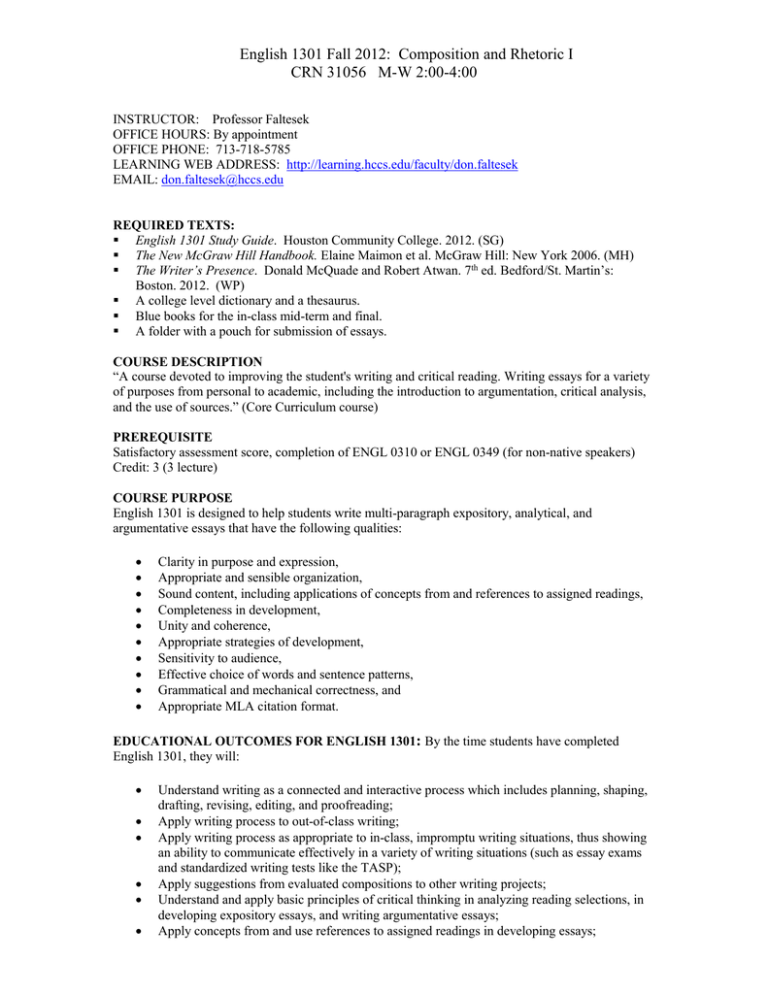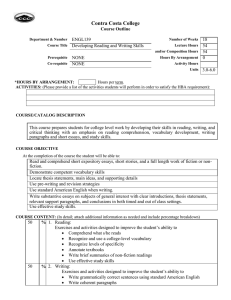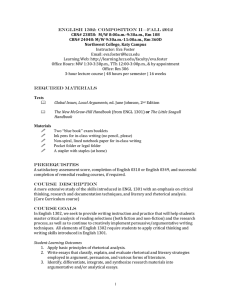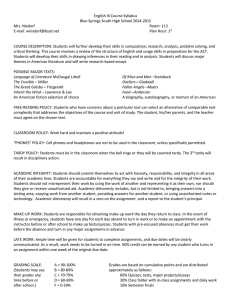English 1301 Fall 2011-1.doc
advertisement

English 1301 Fall 2012: Composition and Rhetoric I CRN 31056 M-W 2:00-4:00 INSTRUCTOR: Professor Faltesek OFFICE HOURS: By appointment OFFICE PHONE: 713-718-5785 LEARNING WEB ADDRESS: http://learning.hccs.edu/faculty/don.faltesek EMAIL: don.faltesek@hccs.edu REQUIRED TEXTS: English 1301 Study Guide. Houston Community College. 2012. (SG) The New McGraw Hill Handbook. Elaine Maimon et al. McGraw Hill: New York 2006. (MH) The Writer’s Presence. Donald McQuade and Robert Atwan. 7th ed. Bedford/St. Martin’s: Boston. 2012. (WP) A college level dictionary and a thesaurus. Blue books for the in-class mid-term and final. A folder with a pouch for submission of essays. COURSE DESCRIPTION “A course devoted to improving the student's writing and critical reading. Writing essays for a variety of purposes from personal to academic, including the introduction to argumentation, critical analysis, and the use of sources.” (Core Curriculum course) PREREQUISITE Satisfactory assessment score, completion of ENGL 0310 or ENGL 0349 (for non-native speakers) Credit: 3 (3 lecture) COURSE PURPOSE English 1301 is designed to help students write multi-paragraph expository, analytical, and argumentative essays that have the following qualities: Clarity in purpose and expression, Appropriate and sensible organization, Sound content, including applications of concepts from and references to assigned readings, Completeness in development, Unity and coherence, Appropriate strategies of development, Sensitivity to audience, Effective choice of words and sentence patterns, Grammatical and mechanical correctness, and Appropriate MLA citation format. EDUCATIONAL OUTCOMES FOR ENGLISH 1301: By the time students have completed English 1301, they will: Understand writing as a connected and interactive process which includes planning, shaping, drafting, revising, editing, and proofreading; Apply writing process to out-of-class writing; Apply writing process as appropriate to in-class, impromptu writing situations, thus showing an ability to communicate effectively in a variety of writing situations (such as essay exams and standardized writing tests like the TASP); Apply suggestions from evaluated compositions to other writing projects; Understand and apply basic principles of critical thinking in analyzing reading selections, in developing expository essays, and writing argumentative essays; Apply concepts from and use references to assigned readings in developing essays; Analyze elements of purpose, audience, tone, style, and writing strategy in essays by professional writers; Complete short writing assignments, journal entries, reading quizzes, and other activities to strengthen basic thinking and writing skills; Understand and appropriately apply various methods of development in writing assignments; Avoid faulty reasoning in all writing assignments; Fulfill the writing requirements of the course, writing at least 5,000 words during the semester. EDUCATIONAL COMPETENCIES IN HCCS CORE CURRICULUM Reading: Reading material at the college level means having the ability to analyze and interpret a variety of printed materials--books, articles, and documents. Writing: Writing at the college level means having the ability to produce clear, correct, and coherent prose adapted to purpose, occasion, and audience. In addition to knowing correct grammar, spelling and punctuation, students should also become familiar with the writing process, including how to discover a topic, how to develop and organize it, and how to phrase it effectively for their audience. These abilities are acquired through practice and reflection. Speaking: Effective speaking is the ability to communicate orally in clear, coherent, and persuasive language appropriate to purpose, occasion, and audience. Listening: Listening at the college level means the ability to analyze and interpret various forms of written communication. Critical Thinking: Critical thinking embraces methods for applying both qualitative and quantitative skills analytically and creatively to subject matter in order to construct alternative strategies. Problem solving is one of the applications of critical thinking used to address an identified task. Computer Literacy: Computer literacy at the college level means having the ability to use computer-based technology in communicating, solving problems, and acquiring information. Core-educated students should have an understanding of the limits, problems, and possibilities associated with the use of technology and should have the tools necessary to evaluate and learn new technologies as they become available. EXEMPLARY EDUCATIONAL OBJECTIVES To understand and demonstrate writing and speaking processes through invention, organization, drafting, revising, editing, and presenting. To understand the importance of specifying audience and purpose and to select appropriate communication choices. To understand and appropriately apply modes of expression (descriptive, expositive, narrative, scientific, and self-expressive) To participate effectively in groups with emphasis on listening, critical and reflective thinking, and responding. To understand and apply basic principles of critical thinking, problem solving, and technical proficiency in the development of exposition and argument. To develop the ability to research and write a documented paper and/or to give an oral presentation. STUDENT LEARNING OUTCOMES FOR 1301 1. Demonstrate knowledge of writing as process. 2. Apply basic principles of critical thinking in analyzing reading selections, developing expository essays, and writing argumentative essays. 3. Analyze elements such as purpose, audience, tone, style, strategy in essays and/or literature by professional writers. 4. Write essays in appropriate academic writing style using varied rhetorical strategies. 5. Synthesize concepts from and use references to assigned readings in their own academic writing ATTENDANCE Come to Class! You’ve Paid For It! You may miss no more than 12.5% of the course. On a TR or MW schedule that equates to 4 sessions. If you exceed this number of absences, I MAY drop you from the course. Valid reasons for missing class include illness and family emergencies. Invalid reasons include, but are no means limited to, conflicts with your work schedule, partying too hard the night before class, or simply not having completed the class assignment. If you have doctor’s appointments or jury duty, you must provide documentation. I begin counting absences the second day of class. I take role at the beginning of class. Don’t be tardy. Three tardies count as one absence. Leaving early is the same as a tardy. If you are tardy, it is your responsibility to make sure, after class, that I’ve marked you present. Otherwise, you will be counted absent. If you need to leave early, please make arrangements with me prior to class. You are responsible for all assignments even if you are absent or tardy. Exchange phone numbers and/or email addresses with at least 3 people in your class by the end of the first week. Do not ask the instructor if you missed anything important. You cannot make up in-class assignments, group work, and peer editing. There are NO makeup exams. Absence is not an excuse for missing a due date. If students stop attending the class, it is their responsibility to withdraw formally. If they do not, they will receive an F for the course. CLASSROOM PARTICIPATION Turn off all cell phones, pagers, beepers and laptops before coming into class. Place cell phones in either your backpack or purse. Anyone holding a cell phone will be asked to leave the classroom. If you are expecting an emergency (pregnant wife, family crisis etc.) see me before class. I know that LIFE happens outside of this class, but… Avoid tardiness. It disrupts classroom discussion and is disrespectful to those already present. Do not bring food in the classroom. Whispering or passing notes is rude. Sleep before you come to class, not in it. This course is based on discussion. However strongly you may feel about the topics that arise, I expect you to behave with courtesy and respect. If someone is talking, do not interrupt. When they’ve finished, you will have your turn. The majority of the time you spend in class will be dedicated to examining ideas. We will talk, read, and reflect. Some topics may arise that disturb, offend or disconcert you. No effort will be made to skirt these topics or to censor them in the classroom forum. Our task is to exercise academic and intellectual freedom through analytical and critical skills. Come to class having thoroughly read the assignment. I recommend that you read each assignment twice, and mark your texts with questions or issues that will enrich the classroom discussion. Remember to bring your texts with you. Remember that attendance and participation comprise 10% of your grade. JOURNALS Journal entries are required for the assignments marked with (J) on the Class Calendar. Bring these to class with you. Journals are formally collected 2 times during the semester, but may be spot checked any day a journal entry is indicated on the Calendar. Responses to specific journal prompts may also be required. Type and double-space all entries in a 12 pt. font on 8 ½ X 11 white paper. Each entry must be at least a half page (1/2) in length to receive a C. Students who want A’s or B’s will exceed this minimum. Consult the Journal Guidelines (at the bottom of this document) for more specific instructions. COURSE REQUIREMENTS: Two 700+ word out-of-class essays, a 600+ word in-class mid-term and final essay, a 1000-1500 word research paper, journal, quizzes, homework, and up to 2 conferences. Participation, conferences quizzes 10% Narration/Description Essay#1 10% Visual analysis essay #2 10% Journals 10% Written in-class midterm (Literary Anal.) 15% NO MAKEUP Written in-class final (Literary Anal.) 15% NO MAKEUP Research paper (Argumentation) 20% The word count provides a guideline of approximately how much you need to write to cover the assignment thoroughly. I post major handouts and assignments on the Learning Web: http://learning.nwc.hccs.edu/members/don.faltesek ASSIGNMENT SUBMISSION Submit your assignments on the due date at the beginning of class. Assignments submitted at the end of class are considered late. Late papers will be penalized 5 points for each calendar day they are due, including holidays and weekends, up to a maximum of 30 points. This includes rough drafts. I accept late homework no later than one class period after its original due date. It will be penalized 1 grade. Note: It is always better to turn in an assignment late than not at all. In-class papers must be handed in at the end of class. Failure to hand in an in-class paper will result in a 0 for the assignment. ABSENCE IS NOT AN EXCUSE FOR MISSING A DUE DATE! OUT OF CLASS ASSIGNMENTS All out of class assignments and outlines must be typed. Handwritten assignments and outlines will be returned unread. Submit the final draft out-of-class major assignments to the Composition tutors at the Writing Center or AskOnline. Download the analysis from each of these online services, incorporate the suggestions, and submit it with your writing package. Additional detailed instructions appear on the specific essay assignment. MANUSCRIPT REQUIREMENTS Papers prepared outside of class must be typed or word-processed on white paper. Double-spaced on 81/2 x 11 paper with 1" margins. Use a 12 pt. font (Times New Roman) and MLA format. Staple the pages. Remember to use a spell checker. Submit all out-of-class major assignments in both hard-copy and on a CD. Files must be in .txt, .rtf, or .doc format. When submitting a revision, include the original version on the CD as well. Compile all required materials before you come to class and submit them in a folder. Major assignments not submitted in a folder or manila envelope will be returned unread and ungraded. GRADES A (90-100%): The student demonstrates superior ability and originality. Thorough knowledge of the material is displayed. The quality of submitted work is consistently high with no stylistic or rhetorical errors. B (80-89%): The student demonstrates above average ability. Knowledge of the material exceeds basic requirements. The quality of submitted work contains few stylistic or rhetorical errors. C (70-79%): The student presents work that adequately treats the assignment. Errors in proofreading, mechanics, style, and rhetorical devises appear. D (60-69%): The student submits below average work that displays little skill or creativity. The work contains repeated mechanical and stylistic errors, and poorly developed assignments. F (0-59%): The student submits sloppy, poorly organized works containing excessive stylistic and rhetorical errors. The work displays little student effort and less interest. MIDTERM AND FINAL Students must have a passing average on these in-class essays to receive a C or better in the course. This is English Department policy. A D average (60-69%) on these assignments will result in a D for the semester, regardless of your other grades in the class. An F (below 60%) average will result in an F for the course. Write in-class essays in Bluebooks in blue or black ink. Write on one side of the page only, and skip every other line. SCHOLASTIC DISHONESTY According to the Student Handbook for the Houston Community College System, scholastic dishonesty includes, but is not limited to, cheating on a test, plagiarism, and collusion. 1. Cheating on a test includes: Copying from another student’s test paper and using materials not authorized by the person giving the test. Collaborating with another student during a test without authority. Knowingly using, buying, selling, stealing, transporting, or soliciting in whole or part the contents of an un-administered test. Bribing another person to obtain a test that is to be administered. 2. Plagiarism means the appropriation of another’s words or ideas and the unacknowledged incorporation of that work in one’s own written work offered for credit. 3. Collusion means the unauthorized collaboration with another person in preparing written work offered for credit. Possible punishments for scholastic dishonesty may include a grade of zero(0) for the particular assignment, failure in the course, and/or recommendation for probation or dismissal from the College System. WITHDRAWAL (Please DO NOT assume you will get a W if you stop coming to class!) If you stop attending class, you must consult a counselor or the instructor to withdraw before the withdrawal deadline. If you fail to do so, you will receive an "F" in the course instead of a "W." The last day to withdraw is noted on the Calendar. In 2007, the Texas Legislature passed a law limiting students starting college in Fall 2007 to no more than six total course withdrawals throughout their academic baccalaureate career. There may be future penalties imposed. Please ask your instructor or counselor about opportunities for tutoring or other assistance prior to considering course withdrawal, or if you are not receiving passing grades. INTERNATIONAL STUDENTS Receiving a W in a course may affect the status of your student Visa. Once a W is given for the course (after you have submitted withdrawal form formally), it will not be changed to an F because of the visa consideration. Please contact the International Student Office at 713-718-8520, if you have any questions about your visa status and other transfer issues. “Students who enroll for most credit CEU classes for a third or more times will be charged an additional $50.00 per semester credit hour and $3.00 per contact hours.” TUTORING HCC offers free tutoring in the Writing Center (Spring Branch), Room 703. Call for information: 713-718-5889 or visit the website: http://learning.nwc.hccs.edu/writingcenter. On-line tutoring is available through AskOnline. The Writing Center and the tutors are here to help you—please avail yourself of this terrific service anytime throughout the semester. ADA ACCOMMODATIONS Any student with a documented disability (e.g. physical, learning, psychiatric, vision, hearing, etc.) who needs to arrange reasonable accommodations must contact the Disability Services Office at the respective college at the beginning of each semester. Faculty is authorized to provide only the accommodations requested by the Disability Support Services Office. Northwest ADA Counselor Mahnaz Kolaini – 713.718.5422 EGLS3 -- Evaluation for Greater Learning Student Survey System At HCC, professors believe that thoughtful student feedback is necessary to improve teaching and learning. During a designated time, you will be asked to answer a short online survey of researchbased questions related to instruction. The anonymous results of the survey will be made available to your professors and division chairs for continual improvement of instruction. Look for the survey as part of the Houston Community College Student System online near the end of the term.




